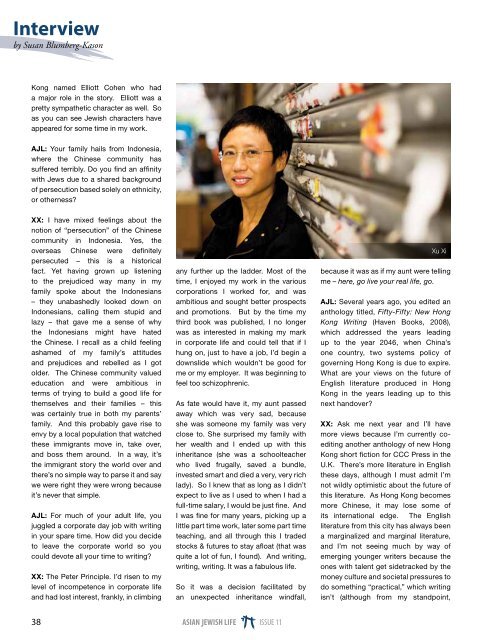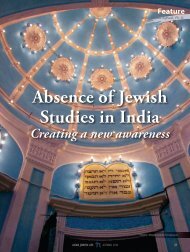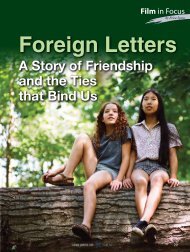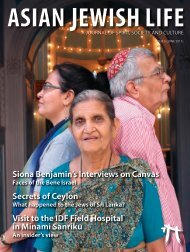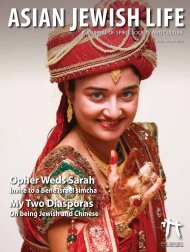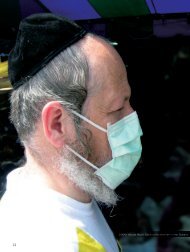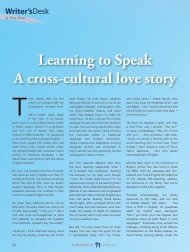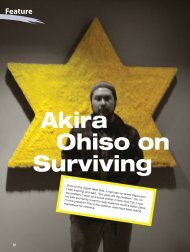AJL magazine - Asian Jewish Life
AJL magazine - Asian Jewish Life
AJL magazine - Asian Jewish Life
- No tags were found...
You also want an ePaper? Increase the reach of your titles
YUMPU automatically turns print PDFs into web optimized ePapers that Google loves.
Interviewby Susan Blumberg-KasonKong named Elliott Cohen who hada major role in the story. Elliott was apretty sympathetic character as well. Soas you can see <strong>Jewish</strong> characters haveappeared for some time in my work.<strong>AJL</strong>: Your family hails from Indonesia,where the Chinese community hassuffered terribly. Do you find an affinitywith Jews due to a shared backgroundof persecution based solely on ethnicity,or otherness?XX: I have mixed feelings about thenotion of “persecution” of the Chinesecommunity in Indonesia. Yes, theoverseas Chinese were definitelypersecuted – this is a historicalfact. Yet having grown up listeningto the prejudiced way many in myfamily spoke about the Indonesians– they unabashedly looked down onIndonesians, calling them stupid andlazy – that gave me a sense of whythe Indonesians might have hatedthe Chinese. I recall as a child feelingashamed of my family’s attitudesand prejudices and rebelled as I gotolder. The Chinese community valuededucation and were ambitious interms of trying to build a good life forthemselves and their families – thiswas certainly true in both my parents’family. And this probably gave rise toenvy by a local population that watchedthese immigrants move in, take over,and boss them around. In a way, it’sthe immigrant story the world over andthere’s no simple way to parse it and saywe were right they were wrong becauseit’s never that simple.<strong>AJL</strong>: For much of your adult life, youjuggled a corporate day job with writingin your spare time. How did you decideto leave the corporate world so youcould devote all your time to writing?XX: The Peter Principle. I’d risen to mylevel of incompetence in corporate lifeand had lost interest, frankly, in climbingany further up the ladder. Most of thetime, I enjoyed my work in the variouscorporations I worked for, and wasambitious and sought better prospectsand promotions. But by the time mythird book was published, I no longerwas as interested in making my markin corporate life and could tell that if Ihung on, just to have a job, I’d begin adownslide which wouldn’t be good forme or my employer. It was beginning tofeel too schizophrenic.As fate would have it, my aunt passedaway which was very sad, becauseshe was someone my family was veryclose to. She surprised my family withher wealth and I ended up with thisinheritance (she was a schoolteacherwho lived frugally, saved a bundle,invested smart and died a very, very richlady). So I knew that as long as I didn’texpect to live as I used to when I had afull-time salary, I would be just fine. AndI was fine for many years, picking up alittle part time work, later some part timeteaching, and all through this I tradedstocks & futures to stay afloat (that wasquite a lot of fun, I found). And writing,writing, writing. It was a fabulous life.So it was a decision facilitated byan unexpected inheritance windfall,Xu Xibecause it was as if my aunt were tellingme – here, go live your real life, go.<strong>AJL</strong>: Several years ago, you edited ananthology titled, Fifty-Fifty: New HongKong Writing (Haven Books, 2008),which addressed the years leadingup to the year 2046, when China’sone country, two systems policy ofgoverning Hong Kong is due to expire.What are your views on the future ofEnglish literature produced in HongKong in the years leading up to thisnext handover?XX: Ask me next year and I’ll havemore views because I’m currently coeditinganother anthology of new HongKong short fiction for CCC Press in theU.K. There’s more literature in Englishthese days, although I must admit I’mnot wildly optimistic about the future ofthis literature. As Hong Kong becomesmore Chinese, it may lose some ofits international edge. The Englishliterature from this city has always beena marginalized and marginal literature,and I’m not seeing much by way ofemerging younger writers because theones with talent get sidetracked by themoney culture and societal pressures todo something “practical,” which writingisn’t (although from my standpoint,38 ASIAN JEWISH LIFE ISSUE 11


